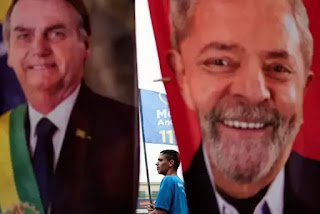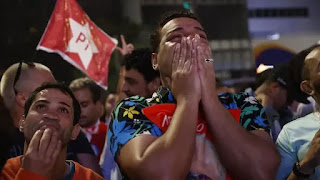Brazilian presidential elections 2022-Lula finished on top in the first round
Former president Lula will face sitting president Bolsonaro in the second round on October 30 as he fell short of 50% votes in the first round
Former
leftwing president Luiz Inácio Lula da Silva known as Lula of left-wing
Workers’ Party (PT) came first in the first round of Brazilian presidential
elections. Lula bagged 57.25 million (57,259,504) - 48.4percent of the votes. He
got 6.1 million more votes than his close rival Bolsonaro. But he fell short of
50% threshold to win outright presidency without going into 2nd round. Couple
of million more votes could have handed Lula a straight victory in the first
round but it couldn’t happen.
Incumbent president Jair Bolsonaro of far
right Liberal Party (PL) received 51.07 million (51,072,345) - 43.2percent of
the votes. The Far right Bolsonaro performed
better than most of the opinion polls predicted. Most of the opinion polls were
predicting 10 to 14 points difference between Bolsonaro and Lula but Bolsonaro
outperformed polls and will face off against Lula da Silva in an October 30
runoff election.
Simone Tebet
came third with (4.91 million) 4,915,423- 4.2percent of the votes while Ciro
Gomes (3.59 million) 3,599,287- 3% of the votes and finished fourth among 11
candidates.
Leftwing Lula
is a frontrunner in the second round on October 30. But there might be a close
contest in the second round. Some leftwing candidates who lost in the first
round might play important role in the victory of Lula in the 2nd
round.
Far right Jair
Bolsonaro claimed during the election campaign that he will only lose the
election in case of rigging. Like Trump during the 2020 US presidential
elections, Bolsonaro accused his opponents for stealing the elections. It seems
that like trump, Bolsonaro might create hurdles in the peaceful transfer of
power in case of Lula victory on October 30.
Bolsonaro’s
party did well in the Senate elections and won 15 out 27 seats on grab. It means
rightwing will continue to enjoy majority in the Senate. His party also
improved its position in Congress. So a
hostile Senate will greet Lula if he wins second round and elected president.
The Senate and Congress majority by his opponents will make life difficult for
Lula as president.
Lula is
known as a man of people and poor. He introduced many social programs and
reforms as the president to reduce hunger and poverty. During his first stint
as president, from 2003 to 2010, Lula introduced or strengthened three key
social spending programs designed to fight hunger and poverty. Under those
programs, severe poverty dropped by 12 percent from 2003 to 2008. The
best-known program, cash transfer initiative called Bolsa Familia, reached
about 11 million families.
Economy,
public health and corruption are the main issues concerning the voters. Some voters
also concerned about education and crime.
Brazil is
recovering from the effects of it’s worst-ever recession, which began in 2014,
and the country continue to struggle with limited growth and high
inflation. Brazil is also still grappling with the COVID-19 pandemic and its
fallout, such as increased poverty and an ongoing education crisis. Meanwhile,
the country’s high rates of violent crimes including murder, robbery, and
kidnapping persist.
Jair
Bolsonaro. A former army captain and congressman, Bolsonaro won the 2018
presidential election campaigning as a right-wing, socially conservative
nationalist. He promised to tackle crime and corruption and boost economic
growth.
However, his
tenure has featured many controversial decisions including cutting funding
for federal education, relaxing gun ownership laws, and weakening LGBTQ+ and
reproductive rights. He has also drawn international criticism for his
treatment of Indigenous communities and the Amazon Rainforest as well as
for his management of the COVID-19 pandemic, which has killed more than 680,000
people in Brazil.
His
reelection campaign has emphasized his extreme rightwing agenda including
his opposition to abortion, transgender rights, legalized drugs, and
restrictions on freedom of religion and speech. He also positions himself as
the business-friendly candidate, backing a more open-market economy and the
privatization of state companies.
Leftwing
Lula is one of the most popular political leaders in the history of Brazil. Lula’s Workers’ Party, with its roots in the trade
union movement, casts itself as a champion of economic and social justice. In
particular, Lula has prioritized tackling low growth, inequality, and a
worsening hunger crisis. He says if he’s reelected, he will increase
social spending, expand social housing, and introduce a debt forgiveness
program. He has also pledged to eliminate the cap on public spending,
increase taxes on the wealthy, and strengthen conservation efforts in the
Amazon.
Khalid Bhatti













Post a Comment